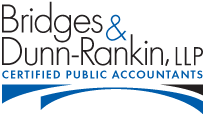Paycheck Protection Program – Expenses Tax Deductible?
By Kenneth H. Bridges, CPA, PFS December 2020
For most small to midsize companies, the centerpiece of the CARES Act (Covid-19 stimulus legislation) was the Paycheck Protection Program (PPP), whereby a business could apply for an SBA loan equal to roughly 2 ½ months payroll. As long as the proceeds were used for qualifying costs (basically payroll, rent, utilities and mortgage interest, with some limitations), the business could then have that loan forgiven.
Under general principles of tax law, if you take out a loan, use the proceeds to pay business expenses, and then later have the loan forgiven, the expenses are still tax deductible, but you have taxable income for the cancellation of indebtedness (COD income). In the PPP legislation, Congress specifically provided that the PPP forgiveness would be considered COD income, but that such income would be excluded from taxable income. Accordingly, Congress made clear its intent that the PPP amount would be nontaxable.
The above notwithstanding, the IRS issued a notice (2020-32) in late April that it intends to disallow the deduction of the expenses paid with PPP funds; which is essentially a backdoor way of taxing the PPP proceeds. More recently, recognizing that some businesses were delaying applying for forgiveness until 2021, the IRS issued a ruling (Revenue Ruling 2020-27) that so long as there is a reasonable expectation that the PPP loan will be forgiven, then there is no income tax deduction for the related expenses in 2020, regardless of when you apply for forgiveness.
Members of Congress on both sides of the aisle, in both the House and the Senate, have indicated that the IRS position is contrary to Congressional intent, and so it appears that Congress may override the IRS and make clear through new legislation that the intent was for the PPP funded expenses to remain tax deductible. Otherwise, a court challenge would appear likely.
Those taxpayers who are basing their quarterly estimated tax payments on actual 2020 income (rather than on 2019 tax liability) will need to make a decision by the due date for 4th quarter estimated tax payments (December 15 for C-corps and January 15 for individuals) whether to base their payment on the PPP-funded expenses being nondeductible (and hope for a refund later) or on the expenses being tax deductible (and risk having a balance due with penalty later). For those who are basing their 2020 quarterly payments on 2019 tax, this decision can be deferred until April 15.
Hopefully, Congress will provide the answer to this question soon. In the absence of new legislation providing a clear answer by the extended due date for business entity returns (September 15 for most flow-through entities and October 15 for calendar year C-corps), a decision will have to be made as to whether to file returns treating the expenses as nondeductible (and potentially amend later for refund if the courts rule against IRS) or as deductible (possibly with disclosure on a Form 8275 or 8275-R to try and minimize exposure to penalties).
Kenneth H. Bridges, CPA, PFS is a partner with Bridges & Dunn-Rankin, LLP, an Atlanta-based CPA firm.
This article is presented for educational and informational purposes only, and is not intended to constitute legal, tax or accounting advice. The article provides only a very general summary of complex rules. For advice on how these rules may apply to your specific situation, contact a professional tax advisor.
